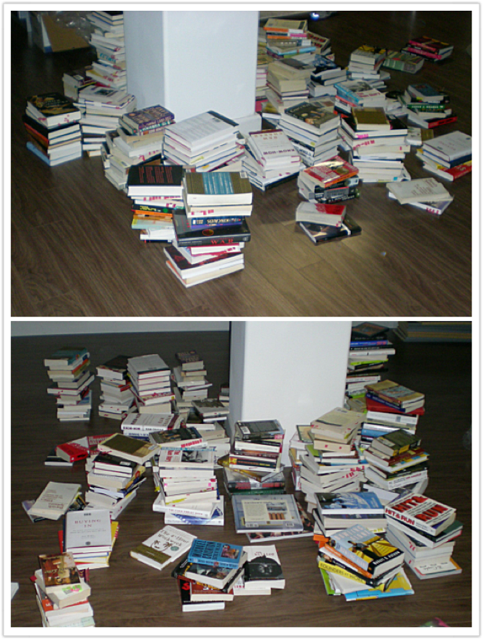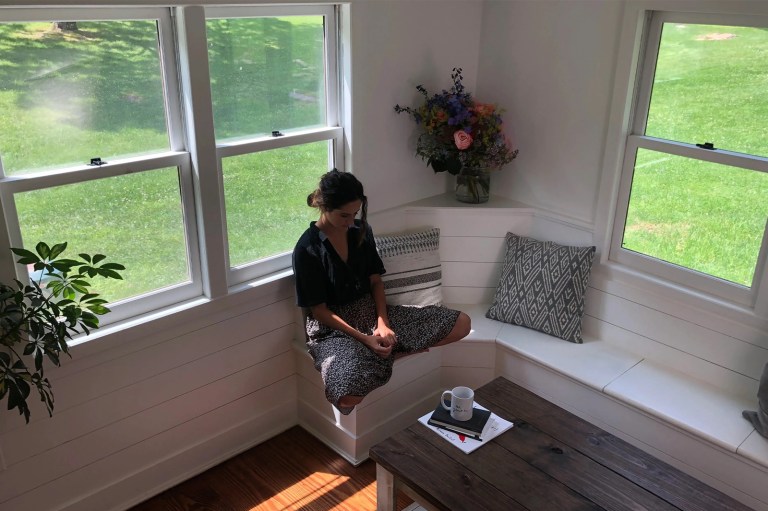
How to Keep A Library Of (Physical) Books
Books are an investment. I understand they cost money upfront...but that’s how an investment works.
By ![]() Ryan Holiday
Ryan Holiday
The hardest part of my most recent move: figuring how to transport nearly 1,500 books. All the rest of our stuff–in the age of IKEA–turned out to be easier to sell on Craigslist or throw away than to move. But the books? Something had to be done.

They are my life and my livelihood.
Ultimately, I ended up hiring 1-800-Pack-Rat to send a portable storage unit to my house– a pod 8 feet by 8 feet by 8 feet– which I filled up and then shipped off to the new house. Nearly 30 full boxes of books were loaded in (plenty of space left if I’d had more). I used movers on TaskRabbit and didn’t have to pick up a single one. The books arrived right outside my door about ten days later. It was amazing. I wish I’d thought of it before.
See, I’ve been keeping a library for as long as I can remember. My enthusiasm has been sporadic of course. (There was a boneheaded moment in college where I sold a bunch of books back because they were giving away Skittles to the people who did it.) But I read a lot and strive to keep, return to and reference what I’ve read whenever I can.

That isn’t to say it’s been easy. I’ve moved a lot over the years and every move makes you question why you keep something that weighs thousands of pounds and takes up many cubic feet. Just two years ago, when I moved to New Orleans, my library was much smaller. Still, I had to rent a small u-Haul trailer just for my books and drive it across the country. And because I had a smaller place, most of the books had to stay in boxes and couldn’t be arranged properly. It was miserable.
Today, finally, after years of waiting, I have them all in one place. I could not be be happier. I’m already reaping the benefits in my writing and my work.

Below are some tips on keeping and maintaining your own library. I hope they help:
-First, you have to read a lot. A lot. Read when you fly, read when you wait for doctors appointments, read when you’re eating, read before bed, take breaks from work and read. Every chance you get, read. If you need recommendations, I’m your man (more on this below)
-Buy, buy buy. I took some heat for criticizing checking books out from the library a while back. Books are an investment. I understand they cost money upfront…but that’s how an investment works. I think I spent something like $4,000 on books in 2012. 75% of that was on Amazon, the rest was B&N in store or various indies. You gotta spend money to make money.
-Oh, that sounds like a lot? Average student loan debt for the same period was about $30k. If you don’t like that equivalency, what’d you spend on cable, movies and bar tabs? What are the chances of that ever turning a profit? The books have more than paid for themselves (if only in improving my life and outlook and providing pure enjoyment, to say nothing of their ideas, inspiration and lessons).
-I’ll be real clear about the benefits of owning physical books: You own them. They are there, physically, in your house. You cannot forget about them. A different app is not one click away. You can see patterns. You can gauge your progress. You can show off your efforts (and you should–reading is something to be proud of). You can look for what you need, find it on the shelf and satisfyingly say “Ah, here it is” and find the exact passage you marked for this purpose.
-In my eyes, there is no question that I am able to write as much as I do and have been able to accomplish as much as I have been fortunate to accomplish because of the library I have built. When I do my taxes each year and look at what I’ve earned vs what I’ve spent on books, I see the correlation and think “Sounds about right” and then I push to up it in the following year.
-In other words, RESIST THE KINDLE. I’ve purchased a fair amount of Kindle books. Do you know how many times I have “flipped” through those books after I read them? Or looked at the notes I took? Never. I don’t even remember which ones I bought. If there were no other reason to prefer physical to digital, this is it.
-Same goes for audiobooks. They are even less justifiable in this sense. Yes they might be easier to listen to in the car, but that convenience comes at a high cost when you are trying to remember ‘where you heard that good idea a couple months ago.’
-The books on your shelves–if properly selected–represent literally thousands of years of cumulative human wisdom. This is wisdom that you can reach out and access at any second. It also stands there, also, as a reminder of the pettiness of so many of our problems and complaints.
-Organize, organize, organize. I do themes (moving messed them all up, but it was fun to start over).
-Some themes of mine: Classics. Fiction. Autobiography. Power/Strategy. Business. Cities I’ve Lived In. Civil War. War. Media/Marketing. Non-Fiction. Hollywood. Big Books That Don’t Fit in Normal Shelves. Etc.
-Have a “LIFE” section–for books that changed your life or books to live your life by. Return to these often.
-Aesthetically, once in themes I prefer to have them arranged in order descending by height. I tried color once but it didn’t work. The height gives it a sense or order and symmetry which you notice only when it is not there.
-Nassim-Taleb talks about an “anti-library.” That is, not just books you’ve read–which represent you know–but all the books you haven’t read. Knowing what you don’t know is just as important. The books you haven’t read are humble reminder.
-At the same time, I find that if books pile up, I don’t read as fast (or I forget them). So I keep multiple Amazon Wish Lists where I track books I intend to read. Every week or so I’ll buy a couple to keep my ahead of schedule.
-Pick one off the shelf every now and then and flip back through it.
-I don’t tend to care if they are brand new, used, paperback or hardcover. I usually try to get whatever the best deal is, or if I’m in a hurry, whatever will arrive first.
-Having a personal library in your house functions as a good litmus test for people who come over. If their first question is “WOW, have you read all these?” it says something about them. If they immediately start looking for books they like, or start inspecting the titles like it’s a bookstore and they’re looking for something to pick up, that says something too. You can tell a lot about a person based on their relationship to reading.
-But it takes up so much space! Just wall space, really. We fill up our living spaces with so much crap, I have to think books are maybe the least bad thing. If it wasn’t there, a couch would probably take its place.
-I understand that keeping a library of books puts you minority or at least part of a dying breed (like someone who started a record collection in 1998). Whatever. Of all the “old” traditions to stick to, a three- or four-thousand-year-old one strictly observed by basically every smart and accomplished person ever seems like a good one to go down with.
-Treat them like shit. Books are made to be broken–literally or figuratively. I recently bought a 80+ year old book for $76 (a rare book called If It Had Happened Otherwise). I took special pleasure folding the pages and writing on them. It’s mine, why treat it like a delicate flower?
-The author signed it? Cool, it’s still for reading.
-We all know that public libraries are calming and quiet. Having books displayed–or better, a room dedicated to it–brings a little of that effect into your home.
-Become a resource for others. I love recommending books. I love being able to suggest “the best” book on a certain topic. Or when you see someone you know reading something, try to think of other books you might like. Nothing builds a connection like a shared book or author.
-Refer back to them! If you’re writing a memo, see if you can’t include an anecdote from a business book. If you’re working on a blog post, cite a book you’ve read. If someone you know is going through something, try to track down that quote you vaguely remember. The more you do this, the better your recall will get.
-The point of owning the books is to use them. Make sure you take notes and keep a commonplace book. It will change your life, I promise.
-Books are no substitute for human contact, but it is still beneficial, I think, to be in the physical company of the greats. There’s no way I’m ever going to be in the same room as all the people I’ve read biographies for. Most of them are dead, for starters. But having their books close to me is a decent half measure.
-Don’t be afraid to quit books that suck. Our lives are too short to suffer through crappy books. There are too many good ones out there–put it down if you stop getting something out of it. If they really suck, sell them back to Amazon, donate to charity or throw them away.
-On that note, don’t collect for the sake of collecting. Leave that for hoarders. Get rid of the stuff you don’t like or have no real use for. When I moved I got rid of two full boxes…which I have subsequently replaced with better stuff.
-Don’t loan. If I LOVE a book enough that I want you to have it, I’ll buy it for you…or I’ll just bother you until you buy it yourself. I’m not letting you borrow my copy. (My grandfather used to put his address labels in books–I still have a few of his copies. It isn’t my style, but seeing the stickers always makes me smile)
-If you need ever a reminder to read, the constant physical presence of books near you in your own home is quite helpful.
-It’s all about the IKEA shelves. Why? Easy, cheap and you can get rid of them if you need ‘em. I prefer the Billy Bookcase but I’ve also used the Expedit
in the past. Higher is better (so if they have the extenders), put the books you need the least at the top and you’ll save room.
-Collect the unusual. My favorite section of books is weird books about animals. It is two full shelves and includes a ridiculous book called The Criminal Prosecution and Capital Punishment of Animals–a fascinating read to say the least.
-If you want a cheesy library joke, refer to your books as the “[Insert Your Name] Memorial Library”
-Is it really that much of a pain to carry books around? I never got this argument. Only once in my life after like a month on the road was I so overloaded that I had to mail some home (and I read way more than the average person). Suck it up, the benefits are worth a heavy suitcase.
-Go through other people’s libraries. I have a standing arrangement with one of my friends who has a lot of books–if I see something I like (and he hasn’t marked up the copy), I take it and ship him a replacement.
-Having a library keeps the information fresh in your head. Even just catching a glance of a title as I walk through the room is a enough sometimes to bring not just the content of the book back into my mind but where I was when I read it, what I was doing, what music I was listening to at the time.
-Try to find those books you remember as a kid. It’s nice to have and every once in awhile it will make you think or smile. I guess that’s why I tell myself I bought a copy of Everybody Poops and the Stinky Cheeseman
.
-Ask smart people for recommendations. Smart people read, people who read become smart. End of story. Find out what worked for other people. It’s a great conversation starter too.
-When you read a book, mark down the other books it cites either in the text or in the bibliography. My general rule is to try to find one new book from every book I read. This will pull you into some weird but unexpected directions.
-Walk into bookstores. Whether you’re in an airport, walking down the street, traveling in a foreign country–try to find bookstores and poke your head in. I always find good, unexpected stuff this way. Sometimes I buy it there, sometimes I make a note and buy it later. Even if you use Kindle or iBooks, do this. Discovery is important.
****
You keep a library ultimately because you love books. Because books are awesome.
But I wanted to write this to make the point that there are other benefits too–benefits that cannot be recreated on your iPad or Kindle. I don’t have a problem with eBooks but I can say seriously that there isn’t a single time that I read a good digital book that I didn’t immediately wish I had a physical copy of.
And these benefits far outweigh any costs or impositions. Though I imagine that next time I move, I’m going to need a bigger storage pod. ![]()
Counterpoint: How To Keep A Library And Read Books In The Digital Age











